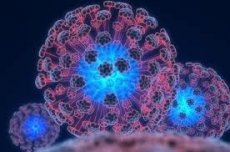Medical expert of the article
New publications
Spanish scientists have successfully tested an HIV vaccine
Last reviewed: 30.06.2025

All iLive content is medically reviewed or fact checked to ensure as much factual accuracy as possible.
We have strict sourcing guidelines and only link to reputable media sites, academic research institutions and, whenever possible, medically peer reviewed studies. Note that the numbers in parentheses ([1], [2], etc.) are clickable links to these studies.
If you feel that any of our content is inaccurate, out-of-date, or otherwise questionable, please select it and press Ctrl + Enter.

An HIV vaccine developed by Spanish scientists from Madrid and Barcelona could transform HIV infection into a chronic disease like herpes, the Journal of Virology reports.
Scientists have published the results of the first phase of clinical trials of the MVA-B vaccine against the immunodeficiency virus. The study involved 30 people, 24 of whom received 3 doses of the experimental vaccine (at the beginning of the study, after 4 weeks and 16 weeks). 6 participants received a placebo. The results of the studies were checked at week 48 of the experiment.
The presence of antibodies to HIV was detected in 72.7% of the participants. Overall, 92.3% of patients who received the vaccine developed immunity to HIV, and 84.6% of them maintained it for 1 year.
The MVA-B vaccine against HIV is based on a modified smallpox virus. The DNA of this virus includes the genes of the human immunodeficiency virus Gag, Pol, Nef and Env, which are not capable of self-reproduction and are therefore safe for humans. The mechanism of action of the vaccine is to integrate HIV genes into the genome, thereby triggering the production of T- and B-lymphocytes. B-lymphocytes, in turn, stimulate the production of antibodies that attack HIV, and T-lymphocytes destroy already infected cells.
The effectiveness of the HIV vaccine was initially proven in 2008 through studies on mice and macaques.
The MVA-B vaccine does not completely destroy the human immunodeficiency virus, but it does keep it under control. If the virus enters the human body, the immune system promptly identifies the affected cells and inactivates HIV.
If the vaccine successfully passes phases 2 and 3 of clinical trials, then in the near future HIV will be no more dangerous than herpes.
As previously reported, Professor Pin Wang from the University of Southern California (USA) and his colleagues created a virus that tracks down HIV-infected cells.


 [
[